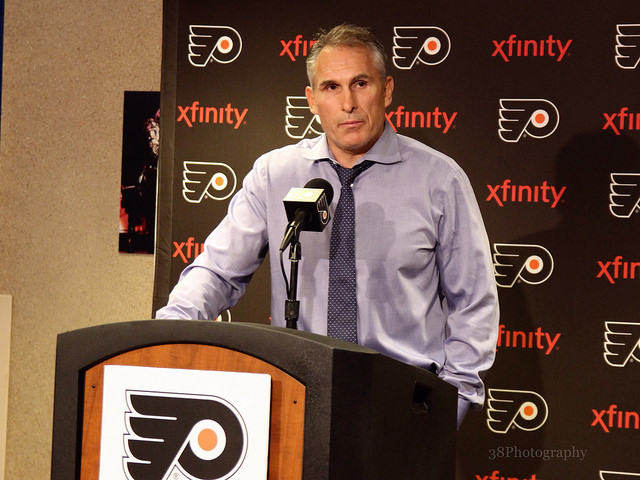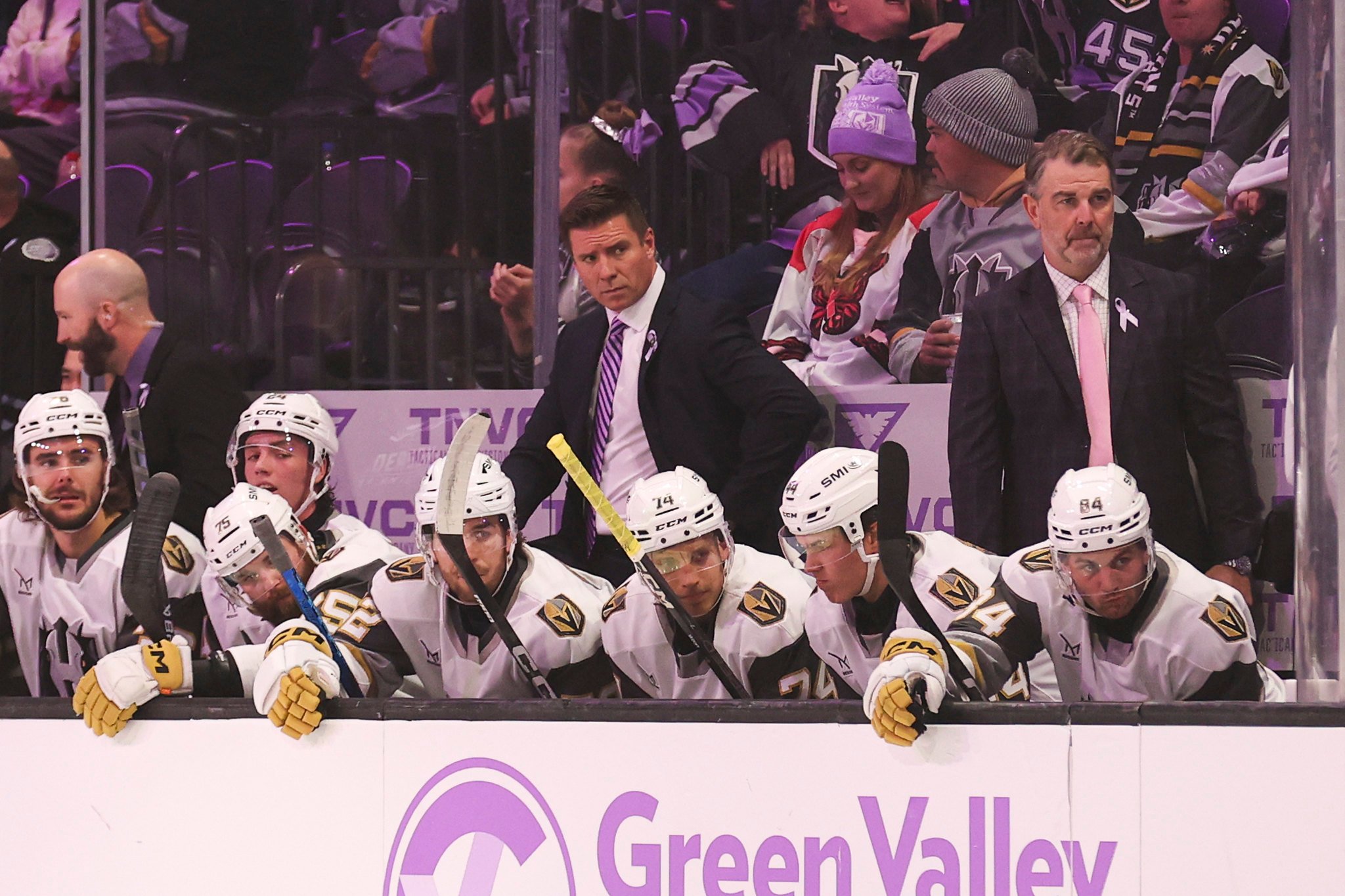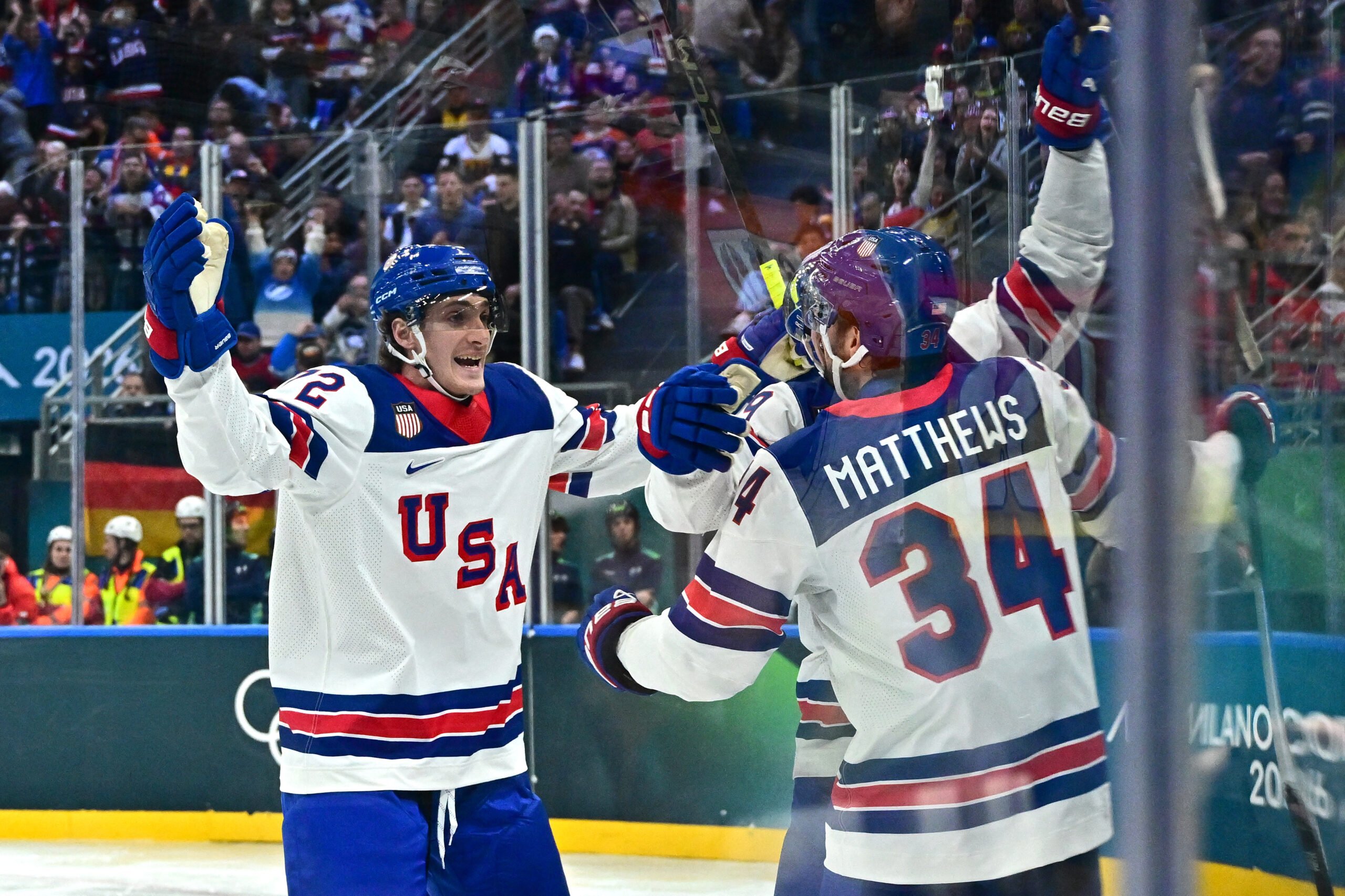Last week, the Philadelphia Flyers introduced Rick Tocchet as the 25th head coach in franchise history. His candidacy has several pluses and minuses, but Tocchet’s previous role in the organization is one of the bigger concerns from some of the fan base. Before his nine seasons of head coaching experience with the Tampa Bay Lightning, Arizona Coyotes, and Vancouver Canucks, his studio work at TNT, or his two Stanley Cup championships as an assistant coach on Mike Sullivan’s staff with the 2016 and 2017 Pittsburgh Penguins, Tocchet was a teenager selected 121st in the 1983 NHL Entry Draft by the Flyers.
He would become one of the greatest draft steals in team history, recording 508 points in 621 games in orange and black and reaching the Stanley Cup Final twice. His blend of physicality and skill embodies what the organization looks like when it is at its best, a level that has been quite distant over the last 15 years. During that stretch, the Flyers were criticized for appointing too many former players to coaching and management positions, failing to identify the best available candidates who went to other teams and reached great heights.
“I was a young kid, 19, when I came over the Walt Whitman bridge to play my first game at the Spectrum. Now, I’ve been gone 20-some years, learned a lot as a player and as a coach over those years. I’ve been very lucky to get ideas off of some of the greatest minds in hockey in the last 25 years, and I hope to bring back some of that knowledge,” Tocchet said in his introductory press conference on May 16.
Five of the previous 24 coaches who came before Tocchet also had playing experience with the Flyers. Is that label as big of a turnoff as some claim to be? Let’s examine each of those individuals to get a greater sense.
Paul Holmgren
Most Flyers fans either remember Paul Holmgren for his playing career as a physical-but-productive member of the post-Stanley Cup victories era or for his role as general manager (GM,) which peaked with the team’s most recent Final run in 2010 but faded into the beginnings of the team’s current malaise. But Holmgren also spent time behind the bench with the team, becoming head coach just four years after wrapping up his playing career with the Minnesota North Stars. One of the players on his inaugural 1998-89 team? A fifth-year Tocchet, who earned his first of four all-star selections that season.
The Flyers continued a concerning regular-season drop-off that season, falling from 100 points and a run to Game 7 of the Final in 1986-87 to 85 points and a first-round exit in 1987-88, down to 80 points in 1988-89, the team’s fewest in 17 years. They did atone for that with an impressive playoff run. They earned revenge against the Washington Capitals for the previous year’s elimination, then took down the Penguins, who would acquire Tocchet a few years later.
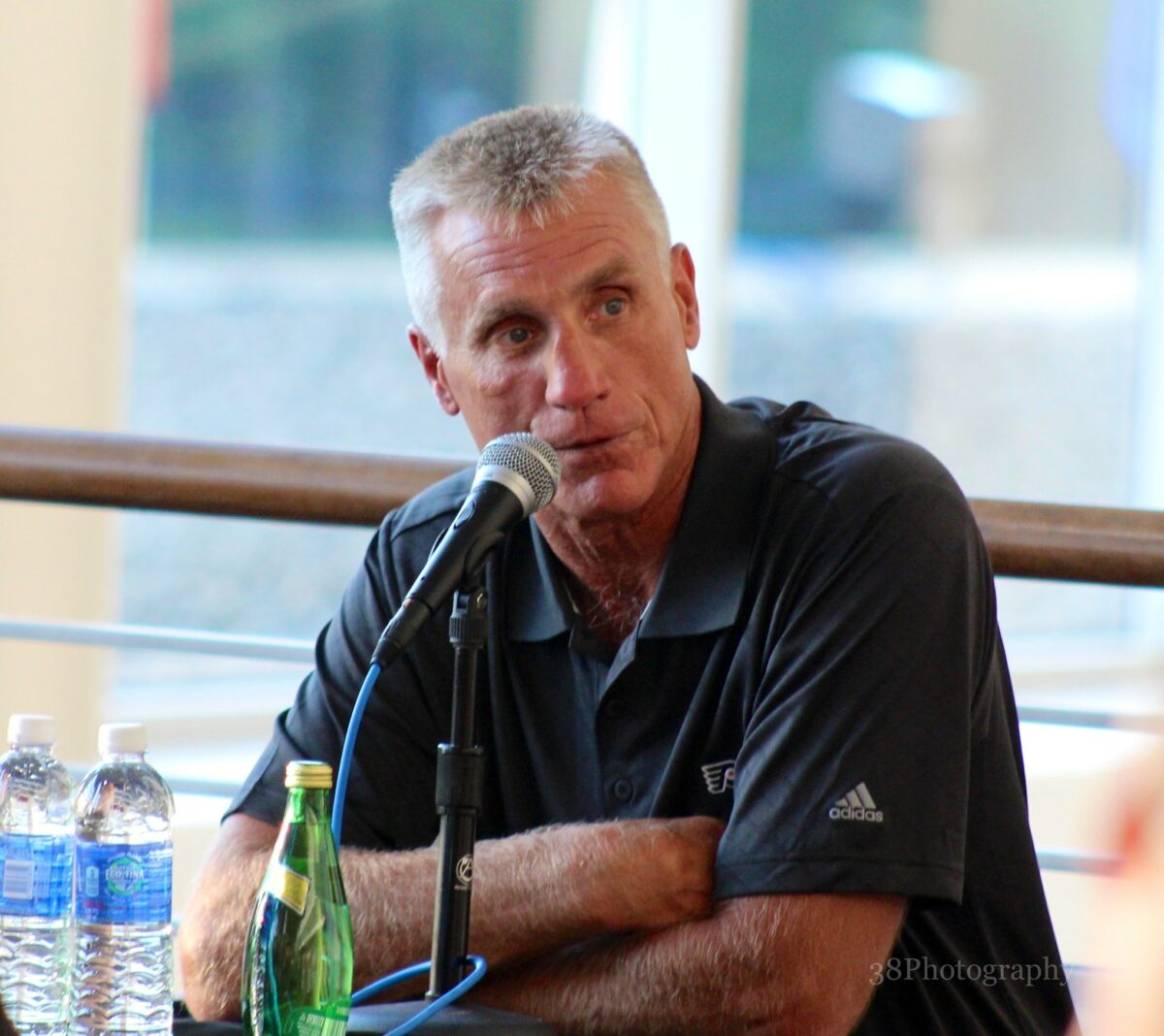
But a six-game Eastern Conference Final loss to the Montréal Canadiens ended the season and that group’s competitive era. The Flyers fell below 80 points in year two and missed the playoffs for the first time since 1972, the first of five-consecutive years without playoff hockey in Philadelphia. Holmgren survived less than half of the drought, fired after an 8-14-2 start to the 1991-92 season. It was a dropoff that fairly closely mirrored the team’s decline after losing the 2010 Final with Holmgren as GM, although pulling out of the current hole is taking longer.
Terry Murray
Terry Murray wasn’t exactly fully entrenched in the Flyers family like Holmgren. His playing career in Philadelphia lasted just 39 games across two separate stints, although he was part of the playoff runs to the Stanley Cup Final in 1976 and 1981. Unlike Holmgren, he had previous head coaching experience; he took over the Capitals the year after their series loss to Holmgren’s Flyers. Washington made the playoffs in the first four of his five seasons, including a year-one Eastern Conference Final run.
Murray took over just a couple of seasons after Holmgren was axed and had the exciting opportunity to coach a young Eric Lindros, who was entering his third season when Murray arrived. That third campaign was a special one for Lindros, even though it was only 48 games due to a lockout. He recorded 70 points in that action, earning the Lester B. Pearson Award (now the Ted Lindsay Award) and Hart Trophy. Even more impressively, the Flyers snapped a five-year playoff drought, with their points percentage improving from .476% to .625%. Just like he did in Washington and Holmgren did six years prior, Murray’s first run with the team ended in the third round, when the Flyers lost in six to the New Jersey Devils.
However, this time, the first season wouldn’t be the pinnacle. With the Legion of Doom fully established, other pieces like Rod Brind’Amour and Eric Desjardins in place, and Ron Hextall back between the pipes, the Flyers were one of the better teams in hockey the next two seasons. They won the Atlantic Division in 1995-96, falling in the second round to another trap-heavy team, the Florida Panthers. But Murray got the Flyers over the hump in year three, leading the team to its first Stanley Cup Final in a decade.
However, they were swept by the burgeoning Detroit Red Wings dynasty, allowing Steve Yzerman and company to cast aside their history of playoff failures and capture the first of four Cups in 11 years. That failure, combined with several internal disputes, such as publicly calling the team out for “choking” during the series and making a surprising goalie change from Hextall to Garth Snow (from “Flyers Fire Murray After Finals Sweep,” New York Times, June 14, 1997).
Such a weird and ugly ending to a tenure makes it difficult to evaluate how good of a coach he was, but based on the numbers, Murray is one of the most successful coaches in team history. However, he’d never so much as win another playoff series in seven more seasons, three in Florida and four with the Los Angeles Kings.
Bill Barber
Speaking of weird exits, enter Bill Barber into the picture halfway through the 2000-01 season. Barber had the most successful playing career of anyone on this list, playing a massive role in the Broad Street Bullies’ back-to-back Cup wins in 1974 and 1975. He’s honored in the Hockey Hall of Fame, and his number seven hangs in the rafters of the soon-to-be-named Xfinity Mobile Center every night.
Barber was a first-time NHL head coach when he took over. However, he had previously served as an assistant during the Stanley Cup Final runs of 1985 and 1987 and led the team’s American Hockey League affiliate to the 1998 Calder Cup championship. The Flyers were in a perilous spot entering the season, with the infamous Scott Stevens hit ending the Lindros era with a bang and a whimper as a 3-1 lead in the 2000 Eastern Conference Final slipped through the team’s grasp. It showed in their underwhelming start under incumbent bench boss Craig Ramsay, who was dismissed after a 12-12-4 start.
Sure enough, Barber turned things around, as the Flyers went 31-13-7-3 the rest of the way, the fifth-best mark in the league. A first-round exit to the Buffalo Sabres wasn’t a great way to end things, but at least it looked like the Flyers had stabilized. Barber received recognition for his fine work, becoming the fourth Flyers head coach to win the Jack Adams Award. Bad news for the remaining coaches on this list: he’s still the most recent one to do so.
The Flyers regressed slightly in Barber’s first full season as head coach but still finished with a respectable 97 points. However, they endured one of the ugliest playoff series losses in team history, managing just two goals in a loss to the Ottawa Senators that somehow went five games thanks to a 1-0 overtime win in Game 1. Barber and the staff were wiped away after the series ended, with GM Bobby Clarke, his former teammate, saying, “We just felt that there was no way of being able to heal the wounds that had developed between the coach and the players,” in what has to be one of the most damning post-firing quotes ever. It came during a time of instability, as Barber was the fifth coach the organization fired in five years.
John Stevens
Barber’s replacement, Ken Hitchcock, took the Flyers on another deep playoff run in 2004, but his reign didn’t last significantly longer than the lot before him. A 1-7-1 beginning to the 2006-07 season forced sweeping change, as Hitchcock was fired and Clarke resigned. There was no saving this wretched season for replacement coach John Stevens, as the Flyers finished the year dead last in the league with the worst season in team history.
You might be surprised that Stevens’ head-coaching tenure in the City of Brotherly Love didn’t end then and there. Ironically, Stevens took over nine games into 2006-07, the same number of games he played for the team from 1986-88. His playing career lasted just 53 games, two shy of the total games the Flyers won in his second season. An aggressive offseason that included adding Daniel Brière and Scott Hartnell led the Flyers to a 42-win, 95-point regular season, plus series wins over the Capitals and Canadiens.
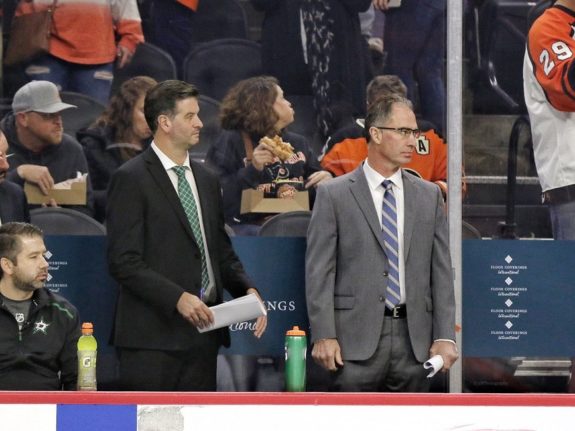
However, Stevens discovered how deadly young superstars Sidney Crosby and Evgeni Malkin were, as the Flyers lost consecutive series to the Penguins in the third round in 2008 and 2009. Despite adding a Hall of Famer in Chris Pronger following the second loss, the Flyers were mediocre in the first half of the 2009-10 season, leading to Stevens’ dismissal for Peter Laviolette. Stevens deserves credit for helping young forwards like Mike Richards, Jeff Carter, and Claude Giroux with their development, not to mention integrating so many new faces seamlessly in 2007-08.
Speaking of Carter and Richards, Stevens won the Cup alongside both as an assistant coach with the Kings in 2012 and 2014. He added another ring almost a decade later as an assistant for the 2023 Vegas Golden Knights.
Craig Berube
At long last, the Flyers hired a Stanley Cup-winning head coach, something none of the previous four figures accomplished. Unfortunately, Craig Berube‘s championship didn’t come for the team he played the second-most games in his 17-year career. Berube racked up 3,104 penalty minutes in 1,054 games, putting him seventh on the all-time leaderboard. He took over in nearly the same situation as Stevens, with Philadelphia fumbling out of the gate in 2013-14 after a solid playoff streak was snapped the previous year.
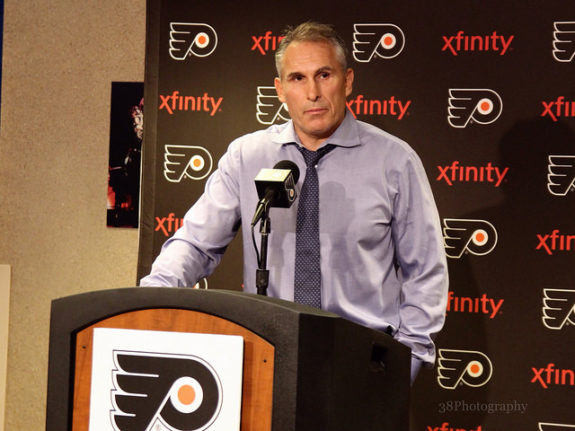
Unlike Stevens, Berube was able to right the ship in year one. It helped that Giroux pulled out of a cold start, using an Olympics snub as fuel for a dominant second half that earned him Hart Trophy consideration. The Flyers recovered to make the playoffs but lost to the New York Rangers in the first round. However, year two didn’t go as great. Part of that was a flawed roster, but Berube didn’t always help matters (Chris VandeVelde on the first line, anyone?) with his decisions. Despite the rare dominant goaltending effort from Steve Mason (.927 save percentage), the Flyers wound up selling at the deadline and missed the playoffs by a healthy margin.
That was Berube’s only full season as head coach in Philadelphia, which worked out for him. He went to the St. Louis Blues as an assistant and once again led a team to the playoffs after taking over in an interim role following a brutal start. This time, the playoff journey lasted longer and improved, as the Blues won the franchise’s first Cup to complete a thrilling underdog story. He took the Blues to the playoffs the next three seasons, but won just one more series before being axed during the 2023-24 season. He’s hoping to end an even longer Cup drought in Toronto, with his first year running the Maple Leafs ending in a second-round nightmare Game 7 blowout.
How Does Tocchet Compare?
NHL head coaching experience is Tocchet’s biggest differentiator from his peers above. Only Murray had previous head coaching experience, and Tocchet’s 638 games nearly double his 325. He’ll also start with a clean slate in September, which is much different than trying to pull out of an early hole like Barber, Stevens, and Berube did, with Barber and Berube doing so successfully in year one.
Surprisingly, communication has been an issue at times with these former Flyers, who you’d think would be able to relate to players the easiest. That was a major downfall for Murray and Barber, as well as making proper tactical adjustments. Tocchet has pros and cons in both parts of his resume. Brière specifically mentioned his communication skills as a major reason for hiring him, although he couldn’t heal the rift between J.T. Miller and Elias Pettersson. He was an assistant coach for Team USA at the 4 Nations Face-Off, a job you don’t get without tactical acumen. However, he’s only been to the playoffs in two of his nine seasons, one of which ended in an ugly series loss to the Colorado Avalanche in the bubble.
Related: Philadelphia Flyers Mailbag: Options with the 6th-Overall Pick & Addressing the Goaltending
Of those five Flyers players turned coaches, only Barber failed to coach in a conference final. As of now, Tocchet has yet to do so. What better place for him to change that?
“I could go on for hours, but I am so excited to be in this area, and I am so appreciative of the ownership, the management, Dan, and Jonesy for giving me this opportunity and trusting me with this team, so saying that, I am happy to be back,” Tocchet said.


